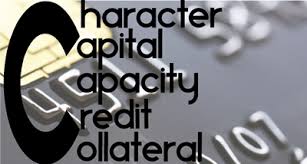At some point of time in life, we all probably apply for some form of credit. Student loans, credit cards, mortgages etc. all fall under the heading of consumer credit. Companies that lend money or make credit available are called creditors and consumers who benefit by these loans are called borrowers or more technically, obligors. Credit evaluation process is pretty straight forward. Creditors would like to know everything and the borrowers have no choice but to tell them just to give them the proof. This evaluation process is known as credit underwriting and encompasses what are famously known as the 5 Cs of Credit.
The 5 Cs of Credit are- Capital, Capacity, Collateral, Conditions & Character. Here’s what they all mean.
- Capital- Lenders would want to know what you own like your money, your cards, your house etc. Also, they would want to know what you owe against the things that you own like mortgages, loans, credit card debts etc. That way they are able to figure out what the financial worth of a person is. Simply, financial worth is equal to what you own minus what you owe.
- Capacity- This refers to your financial capacity, i.e., your ability to address the obligations you currently have, not to mention the additional borrowing you may have in mind. An easy way to calculate this is to add up all your monthly credit obligations including loan payments, credit card payments but not counting rent and mortgage, that’s handled separately. Express this number as a percentage of your gross salary. Here comes the important part. If the total of your monthly credit payments represent 30% or more of your gross salary, then it would be difficult to get approved. Nearly 25% of the gross salary can be assumed to be consumed by taxes. That leaves 75% balance. The rent and mortgage also, should not ideally exceed 25% of the gross salary. So, 50% of the gross salary is left. Now, what if your debt payments represent 30% of your gross salary. Then you will be left with only 20% of your gross salary for everything else like food, clothing, transportation and vacations. This is the reason for the importance of your total monthly credit payments to be less than 30% of the gross salary. This is especially important when it comes to taking on education debt. Don’t let your future loan payments exceed 10% of your gross salary.
- Collateral- This represents the thing which you are looking to finance like the car or the house. It is a lender’s way out in case you fail to make your payments. The lender is going to repossess the collateral and sell it. Lenders rarely lend the hundred percent against the market value of it. That’s because they need to ensure there’s going to be enough of a cushion to cover the repossession and resale costs.
- Conditions– This refers to your personal circumstances with the economic conditions taken into a fact. In simple words, this refers to where you live, how long you have lived there, where you work, how long you have worked there, what skills you have, your educational background and so on. This is where your human capital comes into play.
- Character- It has everything to do with how you have conducted the financial part of your life. This is where your payment history and credit bureau report come into play.
Click here for government certification in Accounting, Banking & Finance





5 Comments. Leave new
Well explained about 5C’s of credit.
Good job done. I’m sure that the 5Cs must be used by the CRA (credit rating agencies) for evaluating companies. Individuals too must consider them before investing or proving a loan.
Informative and well written!
Unique..!
Nice concept and nicely written..